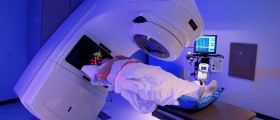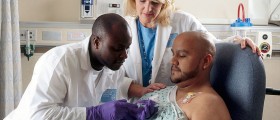
Esophageal cancer appears in the esophagus. This organ is located in the upper part of your body, connecting the throat with the stomach and carrying food. Everything we eat has to go through the esophagus to reach the stomach and to be digested there.
In most patients diagnosed with esophageal cancer, the problem has started in the cells of the esophageal lining. This cancer can occur in any part of this organ, but is often affects the lower portion, closer to the stomach. Esophageal cancer is uncommon in the United States population, but it appears more frequently in people living in Asia and Africa. Some studies have shown that men are more susceptible to development of this cancer, so there are more male than female patients suffering from this condition.
Symptoms of Esophageal Cancer
Early stages of esophageal cancer are known to be asymptomatic (without any apparent symptoms) or to cause swallowing problems (the medical term for this is dysphagia). Patients may experience some chest pressure, burning or pain, as well as fatigue, heartburn and indigestion. Frequent chocking while eating is also reported among patients diagnosed with this cancer. Some of them notice that they have lost several pounds without trying to do so, while others come to the doctor complaining about cough or hoarse voice.
Any persistent or troublesome symptoms should be reported to your doctor. Barrett’s esophagus is precancerous problem and having this condition is known to raise the risk of developing esophageal cancer. Consult your doctor to know what signs can suggest your problem is getting worse. Some patients may be recommended esophageal cancer screening, so ask your doctor whether this is something you should do.
What Drugs Can Be Used to Treat Esophageal Cancer?
Surgery, chemotherapy and radiation therapy are the most commonly used treatments for esophageal cancer.
Chemotherapy involves use of certain drugs (chemicals) in order to kill cancerous cells. These drugs may be used either before or after surgical procedure or sometimes in combination with radiation treatment. If the cancer has metastasized (spread to surrounding or some other tissue in the body), chemotherapy is commonly used alone.
Cisplatin, carboplatin and oxaliplatin are medications frequently used for this purpose and they are usually combined with fluorouracil or sometimes epirubicin. Capecitabine is yet another of chemotherapy drugs that can be used for esophageal cancer.Other Treatments for Esophageal Cancer
High-power energy beams can also be used to kill esophageal cancer cells. The source of beams can be places outside the body or near the cancer, inside the patients’ body. As mentioned, combination of radiation and chemotherapy is also possible option for the treatment of this cancer, although it can cause more severe adverse effects than any of these treatments used alone.

















Your thoughts on this
Loading...